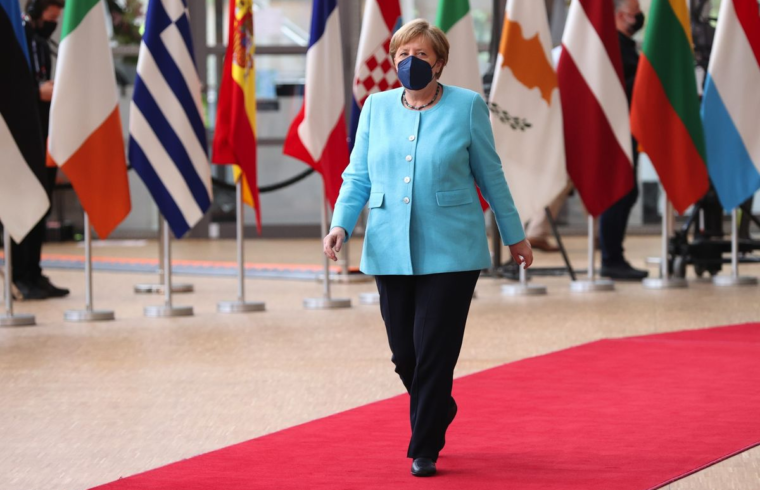

Angela Merkel starts her exit from German politics. Photographer: Dursun Aydemir/Anadolu/Bloomberg
July 15, 2021
Angela Merkel’s remarkable run as Germany’s first female chancellor made her the undisputed queen of Europe, a staunch defender of multilateral institutions, who outlasted enemies and allies alike at home and abroad. And yet for all her virtues as a crisis fighter, the Germany that Merkel created is running out of gas.
The coronavirus at times exposed her fading powers, but even before that Europe’s economic powerhouse was growing less sure of itself, uncertain of its direction and of its place in the world. Some of the problems are a direct product of Merkel’s choices, others she piled up for a future moment that never came, and some were beyond her control. As she prepares to hand over the reins, they present a daunting challenge for her successor.
Cars and Technology
An analogue country in a digital world


A Volkswagen ID.3 electric automobile in an assembly line. Photographer: Liesa Johannssen-Koppitz/Bloomberg
The flashing red light is coming from the car industry. German automakers were dragging their feet over the shift to electric transmissions and, with government support, pushing the claims of diesel as a baby step toward lower emissions. The diesel scandal of 2015 brought that head-in-the-sand strategy to an abrupt halt and triggered the humiliating race to catch up with Tesla.
Tesla Overtakes Germany’s Automakers
Market value

Source: Bloomberg
While VW, Daimler and BMW have the resources to invest in the transition, the same isn’t true for hundreds of small suppliers of transmissions, pistons and tailpipes no longer needed in the electric era. With batteries supplied from Asia and fewer staff needed to produce electric cars anyway, at least 215,000 employees—about a quarter of the industry’s jobs—will become obsolete by 2030 as the value-chain shifts elsewhere, according to a study by the Ifo institute. For those that remain, mastery of the internal combustion engine brings few advantages in the effort to compete with Elon Musk and fend off threats from Apple and Google.
Fewer Jobs
Auto industry jobs in Germany

Sources: VDA/Ifo
The problems facing the car industry are a reflection of Germany’s difficult relationship with technology in general. The country was a superpower in the 20th century world of making things out of metal. But it still hasn’t fully embraced the digital world, as anyone struggling to connect to the office servers during lockdown could testify.
Slow Connections
Average broadband connection speed (Mbps)

Source: Speedtest Global Index, data for April 2021
Despite her science background, Merkel never really got tech. In 2013, 15 years after Google was founded, she famously referred to the Internet as an “unexplored frontier.” The consequences of that blindspot can be seen all over Germany, from the dodgy wifi and the lack of programing jobs to the reliance on old-school engineering firms and the wishful thinking of regulators that contributed to the Wirecard debacle.
Not Many Tech Jobs
Share of technology jobs in total employment in 2020

Source: Eurostat
China
First it made Germany rich, then it made Germany weak


China Shipping Container Lines ship at Hamburg port. Photographer: Krisztian Bocsi/Bloomberg
German companies were early and enthusiastic beneficiaries of China’s boom. A burgeoning Chinese middle-class snapped up luxury brands like Mercedes-Benz cars while cheap labor in Chinese factories churned out critical parts for hundreds of family-owned manufacturers that form the backbone of Germany’s economy. A cautious Merkel didn’t press China over its human rights or its tactics to catch up with the West. Now, it’s too late.
Rise in Exports to China
Share of total German exports

Source: German Statistics Office
China is a superpower poised to supplant the U.S. and soon it won’t need German engineering. If anything, its own technology is just as good, but Germany’s export-led economy is still hooked on Chinese consumers and Berlin is now caught in the middle of a U.S.-China trade war. Merkel herself has acknowledged that the post-war order that let Germany thrive is over. But she still failed to anticipate how the economic tables would turn, leaving the country more dependent than ever on exports to China.
Big Exporter
Exports of goods and services as a percentage of GDP

Source: World Bank
Public Spending
Will Germany dare to use its financial firepower?


Empty Brandenburg Gate in Pariser Platz square in Berlin, Germany. Photographer: Krisztian Bocsi/Bloomberg
For all its headwinds, the German government still has the financial firepower to take on most challenges. The question is, will it use it?
Merkel’s balanced-budget regime, known as the Black Zero, was totemic for her supporters before the pandemic, driving debt levels far below those of Germany’s peers. With the economy motoring ahead and unemployment dropping to a record low, she was easily able to fend off critics who said it was a waste of fiscal space. But the policy was tossed aside when Merkel unleashed hundreds of billions of euros in aid to keep companies and jobs afloat when lockdowns began last year. Now a debate is raging over whether to reinstate it.
Room to Borrow
Government debt as a percentage of GDP

Source: IMF estimates for 2021
The Greens want more public investment in the pivot toward a carbon-free future. Merkel’s heirs are calling for, yes, a more cautious approach. The outcome will affect yields on trillions of euros of assets, the European Union’s push to eliminate carbon emissions and even the bloc’s position in its global competition with the U.S. and China.
Global GDP Rankings
Germany is forecast to slip to fifth by 2050

Source: Bloomberg Economics
Germany needs to boost growth if it wants to maintain its economic heft in the 21st century. While it has held its own for the past 50 years, emerging nations are catching up fast.
Energy
Free of nuclear but stuck with Putin


A floating solar panel farm in Germany. Photographer: Alex Kraus/Bloomberg
As Germany ponders how to catch up with the U.S. and China in the digital world, the country must also navigate another shift with perhaps even more far–reaching consequences: the energy transition.
Most countries are wrestling with how to phase out coal as the world gets serious about tackling climate change. But only Germany is simultaneously shutting down another main source of electricity—nuclear power. That challenge is down to Merkel’s knee-jerk 2011 decision to eliminate German reactors on the heels of the Fukushima disaster in Japan.
The government has since paid billions in compensation to power companies but it hasn’t built a grid that can transport electricity from the turbines of the windy North to the industrial base in the South. And there’s still no working plan to store power for when the sun isn’t shining and the wind isn’t blowing.
Renewable Energy Spending
Energy transition investment since 2004

Source: BloombergNEF
With nuclear out of the picture and plans to eliminate coal, Germany is increasingly reliant on natural gas and on its main supplier, Vladimir Putin’s Russia. That leaves European allies questioning Germany’s resolve against Russia’s malign action—and one U.S. administration after the next demanding a change in course.
The German leader has nevertheless maintained her support for the Nord Stream 2 pipeline, even as she’s accused Putin’s government of violating international law with its seizure of Crimea, its backing of separatists in eastern Ukraine and a series of increasingly aggressive cyberattacks.
German Energy
Generating capacity by type

Source: BloombergNEF
Politics
Once strong and stable, Germany’s oldest political force has lost support


Angela Merkel speaks in the Bundestag. Photographer: Liesa Johannssen-Koppitz/Bloomberg
In a country in need of new ideas, Merkel’s conservative bloc has been looking increasingly out of touch, especially with its infighting during the pandemic. Merkel may be popular, but her party’s membership is built around older, white men. Her successor as candidate for chancellor, 60-year-old Armin Laschet, is just six years younger than Merkel. What’s more, there are signs that German society may be more willing to embrace change than the CDU.
Traditional Parties Have Been Losing Members
Change in the number of party members since 2000, index

Source: Oskar Niedermayer, professor at Berlin’s Free University
By dragging her Christian Democrats to the middle, Merkel created an opening for the far-right to eat away at her party’s support. Germany has never seen such a fragmented political landscape since its reunification and despite an uptick in the most recent polls, the longer term prospects for Merkel’s party—the historic guarantor of stability—have never looked weaker.
Losing Support
German parliament election results

Sources: German Bundestag; Wahlrecht.de











